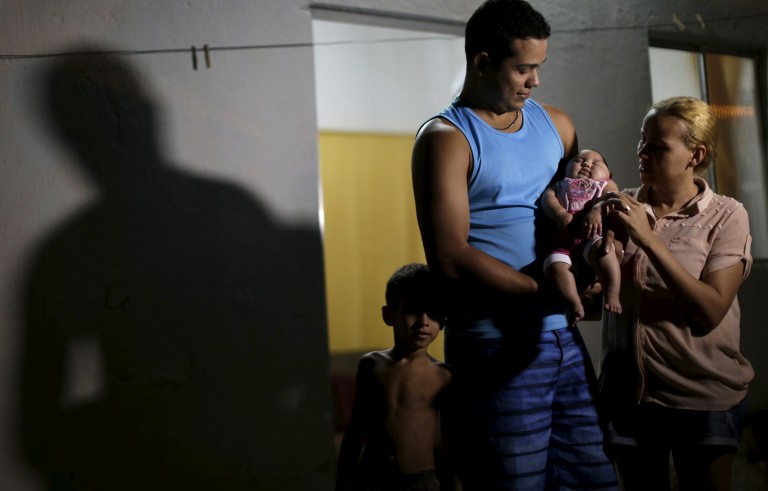(单词翻译:单击)
JUDY WOODRUFF: Just weeks ago, hardly anyone in the U.S. knew what the Zika virus was, much less worried about it. But the World Health Organization's warning today put the Americas, including the U.S., on new notice. And, suddenly, a mosquito-borne virus is raising serious fears, especially for pregnant women.
Dr. Anthony Fauci is with the National Institutes of Health, and he updated the situation today. He joins us now from the NIH campus.
Welcome back to the program, Dr. Fauci.
Just how high a level of concern is there?
DR. ANTHONY FAUCI, National Institutes of Health: Well, we certainly are taking this very seriously. This is a new virus for the Western Hemisphere and the Americas. And it's been explosive in its outbreak in South America and in the Caribbean.
One of the issues that you mentioned that's important is that it is associated, at least temporally and geographically, with a disturbing increase in the incidence of a very serious complication of pregnancy, and that is fetuses having what's called microcephaly.
And microcephaly is a problem with the brain where the skull and the head is small, and there's a developmental problem and/or a damage problem to the brain, leading to dire consequences, often death, but major impairment.

Zika as a virus infection itself is relatively mild, and that's the reason why it's been essentially off the radar screen of people until it came in with a vengeance to South America. It causes a mild illness that lasts anywhere from three to five to seven days, and then it goes away, and you're fine.
It's the potential complication that we're seeing in South America and in the Caribbean with regard to pregnancy. And it's interesting, because it's an association that hasn't been completely proven to be cause and effect.
It certainly is associated, and it's puzzling, and we're trying to figure out just what the nature of this association is between infection and pregnant women and this problem of microcephaly in the fetus and in the infant.
JUDY WOODRUFF: Is it understood why this is spreading so fast?
DR. ANTHONY FAUCI: Well, one of the reasons that we see spread like this, Judy, is that, up until now, South America and the Caribbean has been what we call immunologically naive to Zika virus. They have never had Zika virus in the Western Hemisphere or in the Americas.
And so when a new infection like this comes in, there's no background immunity in the population that would blunt the outbreak that we're seeing now, whereas something like dengue infection has been prevalent in South America, particularly in Brazil, for several years now. So there's that background immunity to it. No such immunity with Zika.
It's perfectly new to them, which makes it much, much easier to explode in the population. That, together with the fact that they're loaded with mosquitoes, who are the vectors of this particular virus infection. The Aedes aegypti mosquitoes are all over South America and Brazil, and that's the perfect vector to spread this infection.
JUDY WOODRUFF: Well, we have talked about pregnant women. Should everyone be concerned? Just women? I mean, who should be most worried?
DR. ANTHONY FAUCI: Well, certainly the focus is on women who are pregnant.
And that is the reason why the Centers for Disease Control and Prevention, the CDC, has given a guideline travel alert that, if an individual, a woman is pregnant, planning to be pregnant, not sure if they're pregnant, they should seriously consider postponing any travel to this region.
And it is recommended that they actually postpone until this situation gets clarified because of this association with this dire consequence.
JUDY WOODRUFF: And what about for men? I mean, for men who contract the virus, can they can they pass it onto a woman through sexual contact?
DR. ANTHONY FAUCI: Well, that's a good question.
What has happened is, first of all, for a man who has no issue with passing it on to a woman sexually, it's a mild illness. But there is a single case that has been reported of a man who was infected in the region, went home to his wife, had sex with his wife, and she definitely got infected with Zika, and she had never left the country.
So, that's one example. We don't know if that's an outlier that's a very rare event, or if that is something that we will see more commonly. And the way you find out is do careful following and natural history studies and case control studies. So we're paying close attention to that. We're not sure how significant it's going to be.
JUDY WOODRUFF: But, as we reported a minute ago, there's no vaccine yet, no treatment.
DR. ANTHONY FAUCI: That is correct. Vaccines under certain circumstances such as this, with a new virus and a new disease, generally take a few years before you have a vaccine that's approved by the regulatory authorities and ready to be distributed.
So, we're not thinking about that for at least another three to five years. However, since we have experience with similar viruses, we are now in the process of beginning the early stages of developing a vaccine for a phase one trial to determine safety and whether or not it induces the proper immune response.
And we fully expect that we will be able to be into that phase one trial within the calendar year of 2016.
JUDY WOODRUFF: And beyond that, just warning people to stay away from these affected areas.
DR. ANTHONY FAUCI: Well, that's the truth. In other words, you have got to be careful, particularly with pregnant women, to make sure that if they are pregnant, that they go by the CDC guidelines and, as best as possible, avoid travel to these areas.
JUDY WOODRUFF: Dr. Tony Fauci at the NIH, we thank you.
DR. ANTHONY FAUCI: Good to be with you.


